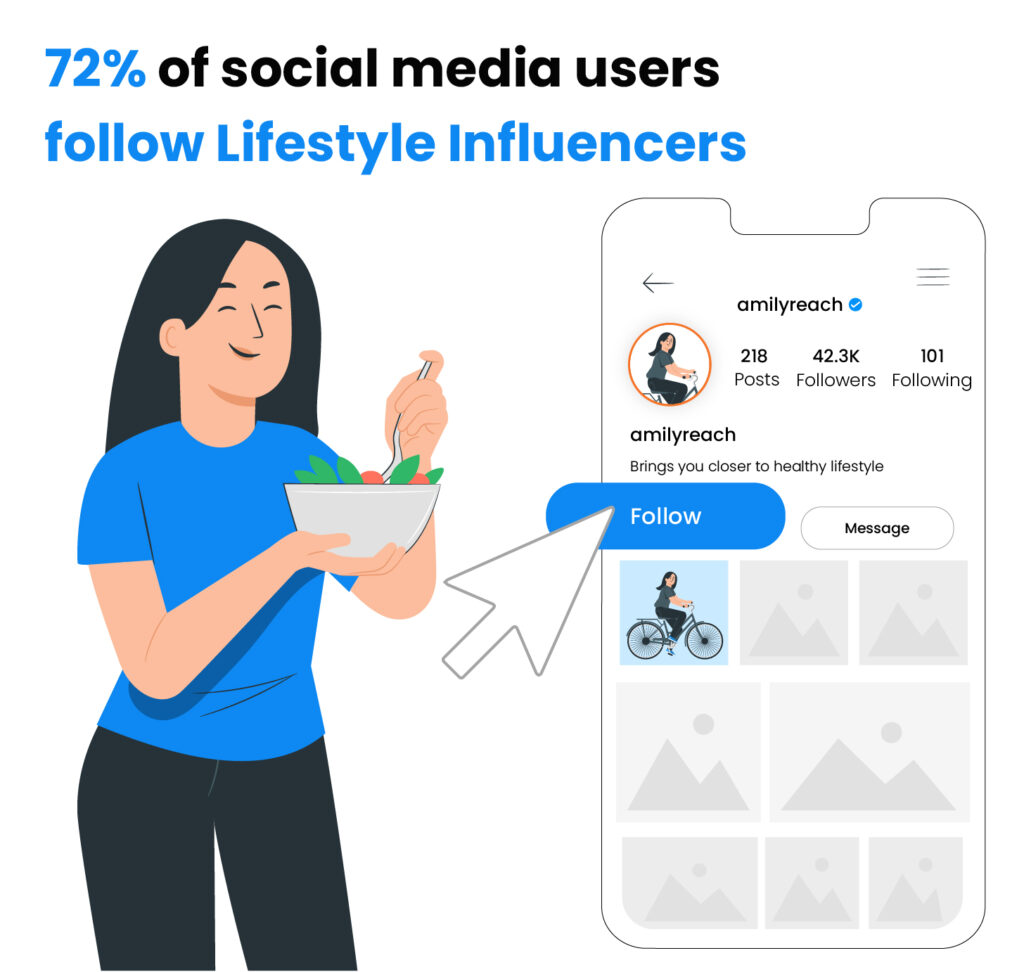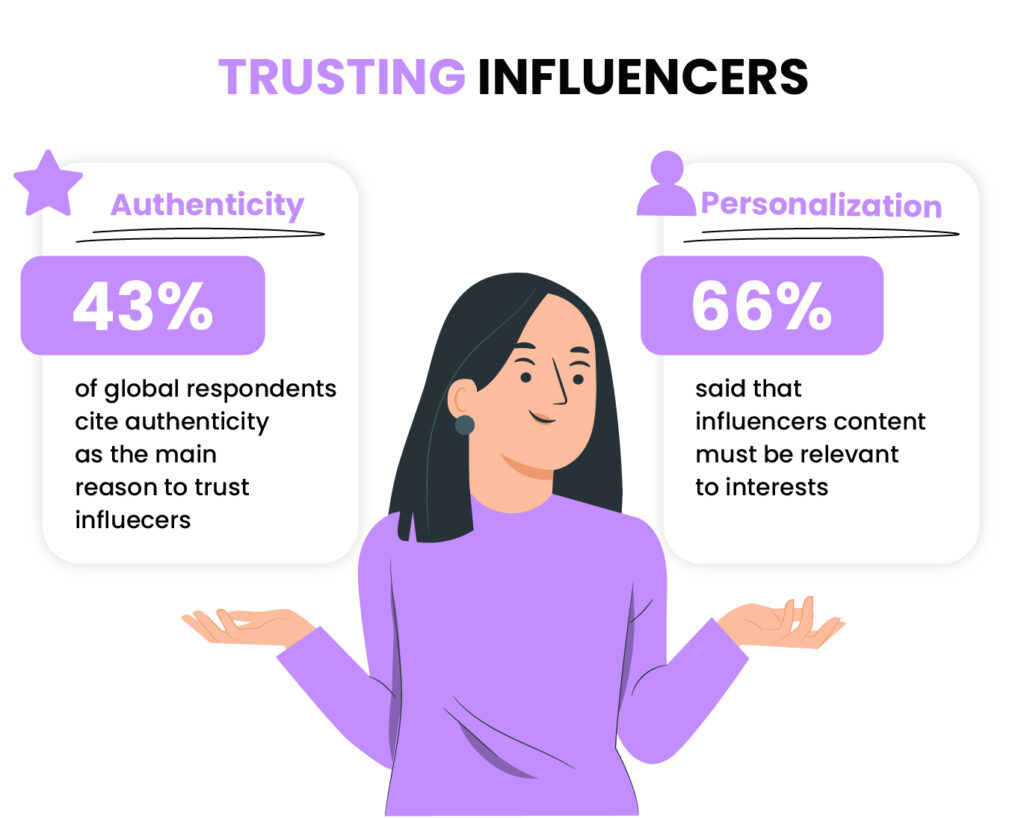The words “affiliate” and “partner” are often used interchangeably, but there are differences between regular affiliates and affiliate partners. What are they? Read on to find out.
What do you think about when hearing the term “affiliate marketing”? It may remind you of shady websites offering miraculous health supplements or other similar products. But many people associate affiliate marketing with influencers who use their blogs or social media accounts to review and promote products. In fact, 84% of bloggers use affiliate marketing to grow their audience and profits.
Usually, it works like this: an influencer presents a product or service to their audience. It may be something they tried recently or something that they like, such as a mobile app or a new beauty product. Most influencers introduce the product by saying a few words about it, mainly how they use it and what is interesting about it. A unique link is included in the review or tutorial, and the influencer’s audience can use that link to buy the reviewed goods (often with a discount). If someone buys the product through that link, the influence receives a small percentage of the sales (called a commission).

The importance of affiliate marketing
People regularly browse the internet to learn what, when, and where they should buy. When was the last time you didn’t check reviews before buying something? As such, product tutorials and reviews are more prevalent than ever. 79% of consumers say they trust online reviews as much as personal recommendations from friends or family. That means an online review of a new coffee machine can work as effectively as a close friend’s suggestion.
Understanding affiliate marketing
Here’s where affiliate marketing comes in. Affiliate marketers aim to be perceived as that trusted friend or family member who recommends a product that they have tried and found to be great.
The results of affiliate marketing can bring pretty spectacular results: in the UK alone, every £1 spent on affiliate marketing returns £15! What’s more, 81% of brands rely on affiliate programs to increase their sales or bring in new customers.
And since affiliates are mostly self-driven, motivated, and knowledgeable enough to keep working on their own, you can just leave them to do their own thing as long as it brings you sales, right? That’s how many brand affiliate programs might have worked in the past. But as your program grows, you might want to find long-term affiliate partners rather than just marketers who come and go.
That’s why affiliate marketing is evolving from being business-oriented to two-way partnerships. This kind of relationship can help you reach new clients and improve your brand’s credibility and reputation.
If you haven’t heard about partner marketing before or were wondering if it’s worth the patience and hard work, this article is for you. Keep reading to learn about the differences between regular affiliates and affiliate partners, as well as the benefits of turning your affiliate marketing into partner marketing.
What is partner marketing?
Partner marketing is a mutually beneficial collaboration between two parties. It can be a collaboration between either two businesses or a business and an individual. Both parties must be willing to share their experience, resources, knowledge, and customer bases in order to accomplish a common goal.
You might think “that’s exactly what I’m doing with my affiliate marketers, so aren’t they my partners?”. There are a couple of differences between regular affiliates and affiliate partners. You could say that regular affiliates are a bit “plug and play”. They have a stable audience, tried and tested methods on how to make affiliate marketing work, plus they can do most of the work by themselves.

However, the relationship between you and them is only about business. They most likely have other clients besides just you and can switch their focus to other brands at any time. On the other hand, you can adjust the number of affiliates you hire or your affiliate program’s requirements as well.
Finding affiliate partners, on the other hand, takes far more time and effort. You need to identify brands or influencers that will fit your program like a glove, and you also need to spend time building up trust. Setting mutually beneficial goals and partnership conditions will also require patience from both sides. With so many things to do, is finding an affiliate partner worth all the hassle?
Benefits of an affiliate partnership
It definitely is! A well-thought-out affiliate partnership involving a company or person matching your brand’s profile and products is a must for spreading the word about your brand to a larger audience and boosting lead generation.
But that’s just the start – by working together, brands can achieve far more while spending less than if they worked separately.
Benefits of a brand partnership:
- Allows partners to share the workload and costs of campaigns.
- Each partner brings fresh perspectives, ideas, skills, technical expertise, knowledge, resources, and contacts.
- Partners can freely exchange insights, knowledge, skills, and best practices.
- Partnership encourages teamwork, cooperation, and finding a middle ground between different ideas.
- Adds credibility to both partners, which in turn helps them speak more confidently.
The main point of the collaboration? To reach new clients by promoting products or services to each other’s audience. As an example, have a look at the RedBull and GoPro joint partnership.
Both of them are lifestyle brands with several things in common. Both target active people interested in sports and challenges. It makes them a perfect fit to pair up for sports campaigns. The brands have worked together closely for years – they worked together on the Red Bull Stratos project, for example. In 2016, they finally decided to become official partners.
The GoPro brand provides equipment for thousands of Red Bull sponsored events across more than 100 countries, while Red Bull received some equity in the GoPro business.

Both companies also share rights for content that is distributed across both of their channels: the GoPro Channel, Red Bull TV, Red Bull.com, and others. The result? It’s now hard to imagine GoPro without Redbull and vice versa.
As both companies had similar goals and overlapping audiences, they were both able to make themselves known to different users and find new ways to promote their products.
How can you find the right affiliate partner?
How can you find the right partner for your own program? First, you need to know your own goals for the affiliate partnership. Do you want to:
- Find a new audience?
- Increase your brand reach?
- Boos your brand image?
Then you need to ensure that you and your affiliate partner have shared interests, vision, goals, and objectives. That will require a bit of research on your side. Another list of questions to be answered:
- Who is your ideal partner’s audience?
- What channels or methods do they use to reach their audience?
- How does it tie into your product or service?
- What can you offer them in exchange for their support?
It might be tempting to offer an “affiliate partnership” to a popular influencer or blogger with a large audience. But their audience may be a “little different” than your ideal customers. With such an approach, there’s a risk that this “partnership” might only end in losses on both sides. You may not find your ideal customers there, and your partner will risk losing the trust of their audience.
And if the match between you and your affiliate partner doesn’t feel natural, that might leave both your audience and the partner feeling confused. Imagine how you would react if your favorite cooking blog suddenly started promoting gym wear – you would probably be a bit suspicious, right?
However, if the same blogger partnered with kitchen utility or cooking course sellers, that would feel far more natural. Plus, with a “partner” from a different area and with a far more diverse customer base, you might not be able to find common ground. Thus, the partnership may end before it really gets started.

Conclusion
Building a relationship between yourself and an affiliate partner will take time and effort on both sides, but the benefits will more than makeup for the costs. Rather than having a solitary marketer for whom you are just another brand they work with, you can collaborate with a partner that you can really count on. To find such a partner, though, you need to perform adequate research about your own company and products, as well as your potential affiliate’s goals and ideas.
Share this article
How To Find Affiliates to Sell Your Products
Discover over 10 successful strategies for finding high-quality affiliates in 2024 to boost your product sales. Learn to leverage influencers, join affiliate networks, and enhance your reach through SEO and social media. Maximize revenue with transparency and ongoing monitoring in your affiliate marketing program.
Discover the essential role of affiliate software in managing and optimizing your affiliate marketing programs. Learn how it streamlines link tracking, referral management, and commission payments, ensuring data security and fraud prevention. Unlock growth opportunities with efficient program management and boost your business's reach and ROI. Visit now to explore the benefits of investing in affiliate software!
Explore Post Affiliate Pro's comprehensive Affiliate Marketing Glossary to enhance your industry knowledge with easy-to-understand definitions of essential terms. Perfect for marketers seeking to understand the fundamentals and advanced concepts, this glossary helps you master the language of affiliate marketing. Visit now to boost your expertise!
The Evolution of Affiliate Marketing: What to Expect in 2025
Explore the future of affiliate marketing in 2025 with insights and trends to boost your strategy. Discover what's next!










